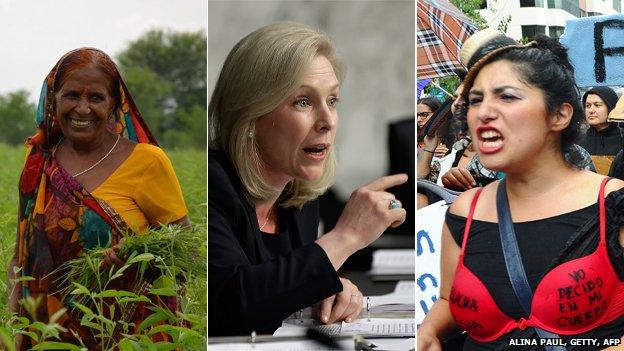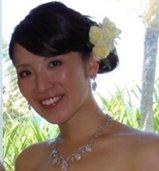100 Women: Your views on life in the 21st Century
- Published
- comments

Women's rights have progressed at an astonishing pace over the past 100 years. As part of the BBC's 100 Women series we asked you to send us your thoughts on what it is like to be a woman in the 21st Century.
The responses revealed differences, including how female empowerment is defined around the world.
BBC News users in some African and Middle Eastern cultures view empowerment as the freedom from fear of physical and sexual abuse. Some in Europe, though, stress how they want the freedom to follow a more traditional path, as primary care-giver and mother, instead of being an equal breadwinner.
Universally, women told us they believed education was the key to changing sexist attitudes and practices in society.
We have taken some of your comments and turned them into an interactive quiz - why not see if you can guess how the women answered?
100 Women Quiz
.
For more detail on views around the world, here are fuller responses from women who have been following 100 Women on the BBC.
South Africa - Alex Biess, 29

Alex Biess is a 29-year-old unmarried woman from Cape Town. She has a high school diploma and runs her own bakery business employing 40 people.
Physical safety and rape are big issues in South Africa. Even if it doesn't get that far, men think that women wearing short skirts are available to touch inappropriately.
Another issue is the lack of encouragement girls get, especially black girls from poorer families. Our society lives very much hand-to-mouth and girls are brought up to expect to work for someone else for a low wage.
I think this country is prone to violence. Within Cape Town we have a big homosexual community. The gay men are subjected to attacks too. Gay women are also subjected to "correctional rapes" by men thinking that will turn them heterosexual.
We live in a very unequal society, maybe the most unequal place in the world, and you have to live here to understand that.
I work with many black South Africans and see them as my family. Mothers don't talk to their daughters about sex or sex education. The subject is swept under the carpet. Even if they are sexually abused there's no real forum to talk about it in their tradition.
I suggest women are more open among themselves and insist on men using condoms so children aren't brought into this world that their families can't afford.
For women in the West who feel they have to make a choice between working and raising children, I think you have to go with your gut feeling. Education can further one's career and economic wellbeing, but not having a mother around can be really detrimental to that child's life chances.
In South Africa, one thing we do have is "black mamas" who look after your child and are there to support you. Around the world, costs of child care prevent many women from doing this, but I think that's why in South Africa women are able to go back to work, because they have the support of domestic live-in help.
New Zealand - Pamela Mills, 27

Pamela Mills is a politics graduate from Auckland.
People think New Zealand is really good for equality because a few years ago the top five jobs in the country were all held by women, but it's not like that for most normal people. I'm really struggling to find my place at work. I have a politics degree, a decent IQ and a desire to succeed and make a difference in this world but I've not been promoted beyond the position of secretary in all of my jobs.
I've been working for five years now in different places and the last time was working for a council for more than a year. There's never any men in these office support roles. It just makes me feel a bit second class.
I know I can do more, I want to be a project organiser or a policy adviser but I just don't get called. Another girl I know has a planning degree who started in an admin role like me. Even when she got promoted to junior planner they didn't fill her admin role and they still expected her to do her old role too.
But then, I guess I'm lucky because I feel safe when I go out. I haven't had anything happen to me and I don't face any other discrimination really. I've just moved to Melbourne this week to see if it's any different there.
Japan - Shizuka Shirasuna, 33

Shizuka Shirasuna is a marketing analyst who lives with her husband in the Ibaraki prefecture. They have no children.
More Japanese women are more highly educated now. They are working in good jobs and are becoming more independent, and some of them choose to be single. But getting married is still very important in Japan.
Now it is the case that men might have unstable jobs and if they do not have to support a family they are happy to stay single too. The men are not as aggressive as they used to be, possibly because women have become stronger.
It is very expensive to live in Japan and in this economic climate a lot of couples both work. They share the house work and share the responsibility of raising children together and some men are taking paternity leave now. Society is becoming less conservative and more liberal. We are being influenced more by foreign countries.
Arranged marriages used to be very common but now there are more love matches. There is a reluctance among some women to balance working with child care. They are worried about how difficult it will be to go back to work and whether they will get maternity leave. Women are also reluctant to lose their independence. The government is working really hard to encourage companies to offer good maternity packages and to provide day and night nurseries.
I really want the government to reassure women that it will be ok if they have kids and they will still be successful, and to make it less expensive for families to afford things and provide a good standard of living for the children. Women need to feel secure and reassured, that is the only way to tackle the birth rate.
My advice to women who are struggling to be independent is to make sure they are educated.
India - Dr Sreeparna Ghosh, 32

Sreeparna Ghosh, 32, has a PhD in anthropology, is married, and lives Mumbai.
I would say I have parity with my male colleagues as a researcher. Superficially we have had some progress with more women visible in the public space than we had a few decades ago.
I think that's largely down to education. My family value education because they came as refugees from Bangladesh to Mumbai and I think that makes them work harder to achieve success and improve themselves.
My mother didn't work because there is still no child care in India and she had no family in Mumbai. She was quite bored I think. That is beginning to change now as more women are getting educated and getting higher paid jobs.
On the other hand crimes against women, external have increased exponentially. Bias against women is entrenched in the micro-politics of the household with daughters-in-law routinely being killed, beaten and abused in so many ways by husbands and parents in-laws. They are also discriminated against by realities like female infanticides.
I may teach my daughter, if I have one, to be a feminist, but unless we all teach our sons to be feminists too, there is no hope for the country.
I would give the same advice to women from Pakistan, or anywhere, where women are treated unequally simply for being women - you have to change the way children are mothered to teach girls to fight for their place in the world and that boys' sense of entitlement is unreal.
Germany - Rita Kleppmann, 62

Rita Kleppmann is a 62-year-old, Oxford-educated British woman who emigrated to Germany 30 years ago. She lives in Baden Wurttemberg and has raised four children with her husband.
When people asked me what job I did, I'd tell them I was a general manager, dealing with logistics, arbitration and talent investment, that kind of thing. Those were the skills I needed to raise four children with my husband without the help of a nanny.
I think, even more so now, women in Germany do feel under increasing pressure to go back to work after having children, and women who want to be a mother and a housewife are seen as somehow old fashioned.
Are women better off juggling numbers, whether it's financially, or for a large company, whatever your job may be? Or is your time better spent forming the next generation and making them better off, reading them stories and listening to them?
Syria - Cham, 40
Cham* is a single Syrian woman in her mid-40s. She is originally from Damascus but left Syria in the summer because of the fighting.

In Damascus women were relatively free, for example I worked, I drove and owned my own car, and before the curfew I could come back by myself at one in the morning and no-one dared to say anything to me.
That has changed since the crisis.
In spite of everything I hear in the news about the Syrian Army, I have never been harmed by them, even in words. I met them at the checkpoints every day on my way to work and they treated me with a lot of respect.
In war men are turned into animals, this happens everywhere and of course does not apply to all men. During wars bad people move freely and it becomes their own real world. I don't bear to sleep alone. I always have my brother or my nephew at night. In central Damascus we have not heard of many sexual attacks against women. But in other places yes, it does happen.
I am a Muslim and there is a difference between religion and culture. If you know Islam very well it is something that empowers women. Lots of men though abuse women under the cover of religion. But that is not religion, that is culture and his own mind.
If I had one wish for women in Syria it would be for education - educate mothers how to raise their children to treat women equally. You cannot change your husband but you can teach your children.
*Cham is not her real name. Her name has been changed for security reasons.
Brazil - Maria Alice Sadek, 56, Sao Paulo

Brazilian widow and former journalist and teacher
There is a lot of discrimination against women in daily life. When you go to the mechanics, they always think women are gullible. Even at the gas stations they try to make you pay more. In business too, women can hold the same position as a man and will be paid less money for it.
Brazilian men are very dominating. The man is the head of the family and always has the final word. They are also chauvinistic, proprietorial of their women and jealous. That's why I married an Englishman.
A law was passed here against domestic violence and to stop men beating up women when they were drunk, drugged or stoned. But that can happen in any country, not just Brazil. There is no feminist movement here as such. Even though you can have a profession - the president is a woman - it's still a patriarchal society.
It's not just women either that are discriminated against. It's not open, but you don't see any black people employed, no engineers not even black waiters and we do have a lot of black people. There is now a quota for black people in schools to try to help them get better jobs and earn more money.
Yes Brazil is a patriarchal society, but women also like being looked after. In some countries, especially Muslim countries, where the younger generation want it to change, I think discrimination against women is very ingrained.
Here too, men may be the head of the family but there are feminine ways to influence men, to make them think it is their idea. That wouldn't be ok at work though - there the woman has to be tough and just stand up for herself.
The views expressed by the case studies are anecdotal.
Join in the debate online by using #100Women, external on social media. Our coverage continues at our special 100 Women website and culminates with the 100 Women conference in London on Friday 25 October. The event will be streamed live on the BBC News website.
Production and interviews by Sitala Peek